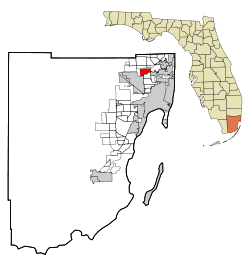Grandpa-locka
| Grandpa-locka | |
|---|---|
|
County and state location
|
|
| Basic data | |
| Foundation : | 1926 |
| State : | United States |
| State : | Florida |
| County : | Miami-Dade County |
| Coordinates : | 25 ° 54 ′ N , 80 ° 15 ′ W |
| Time zone : | Eastern ( UTC − 5 / −4 ) |
|
Inhabitants : - Metropolitan Area : |
15,219 (as of 2010) 5,564,635 (as of 2010) |
| Population density : | 1,358.8 inhabitants per km 2 |
| Area : | 11.6 km 2 (approx. 4 mi 2 ) of which 11.2 km 2 (approx. 4 mi 2 ) is land |
| Height : | 3 m |
| Postal code : | 33054 |
| Area code : | +1 305 786 |
| FIPS : | 12-51650 |
| GNIS ID : | 308425 |
| Website : | www.opalockafl.gov |
| Mayor : | Myra Taylor |
Opa-locka is a city in Miami-Dade County in the US state of Florida with 15,219 inhabitants (as of 2010). The city, founded in the 1920s, has a large number of buildings in the style of oriental architecture .
geography
Opa-locka is located about 6 miles north of Miami . Adjacent communities are Miami Gardens , Hialeah, and North Miami .
history
The name of the city was borrowed from the Seminole language. They called the area Opa-tisha-wocka-locka (large island covered with trees and swamps), which was shortened to Opa-locka. The city was founded by aviation pioneer Glenn Curtiss . He had the architect Bernhardt Muller erect numerous buildings with oriental elements, and some of the streets were named after characters from Thousand and One Nights . Opa-locka received city rights in 1926. After the Great Miami Hurricane in the same year and the death of the Florida land boom , the young community profited from the establishment of a Navy base. After its closure in the 1950s, Opa-locka transformed from a suburb populated by middle-class whites to a community with a predominantly colored and less affluent population. Crime and unemployment rose from the 1980s, and in 2003 Grandpa-locka had the highest violent crime rate in any small town in Florida. In addition, in 2002 the state had to take over the finances of the city, which was in dire straits due to mismanagement.
Demographic data
According to the 2010 census, the then 15,219 inhabitants were distributed over 5,966 households. The population density was 1358.8 inh / km². 27.7% of the population identified themselves as whites , 65.8% as African American , 0.2% as Indians and 0.2% as Asian Americans . 4.0% said they belonged to another ethnic group and 2.1% to several ethnic groups. 35.3% of the population were Hispanics or Latinos .
In 2010 children under 18 years of age and 24.8% of all households lived in 44.1% of all households with persons at least 65 years of age. 68.5% of households were family households (consisting of married couples with or without offspring or one parent with offspring). The average household size was 2.98 people and the average family size was 3.52 people.
32.4% of the population were younger than 20 years, 29.1% were 20 to 39 years old, 24.2% were 40 to 59 years old, and 14.2% were at least 60 years old. The mean age was 31 years. 47.4% of the population were male and 52.6% were female.
The median annual income was $ 22,214, with 32.6% of the population living below the poverty line.
In 2000, English was the mother tongue of 68.44% of the population, 28.29% spoke Spanish and 3.27% had another mother tongue.
Architectural monuments
Opa-locka has more than 20 buildings listed on the National Register of Historic Places . These are still existing buildings of the oriental style buildings from the 1920s.
|
|
traffic
Florida State Roads 9 , 817 , 916 , 924 and 953 lead through Opa-locka . The city has a Tri-Rail station on the Miami- Mangonia Park railway line . The national Opa-locka Executive Airport is also located in the city area. The Miami International Airport is located 10 km south of Opa-locka.
Personalities
- Randall Bailey (born 1974), boxer
- Flo Rida (born 1979), rapper
Web links
- Website of the city (Engl.)
Individual evidence
- ↑ City of Opa-locka: History (English)
- ↑ Community History Report ( Memento of the original from August 22, 2011 in the Internet Archive ) Info: The archive link was inserted automatically and has not yet been checked. Please check the original and archive link according to the instructions and then remove this notice. , mpoportal.fiu.edu (English)
- ^ Profile of General Population and Housing Characteristics: 2010 . United States Census Bureau . Retrieved March 22, 2013.
- ↑ Language distribution 2000 . Modern Language Association . Retrieved March 22, 2013.
- ^ Florida - Dade County. National Register of Historic Places , accessed July 28, 2015 .





